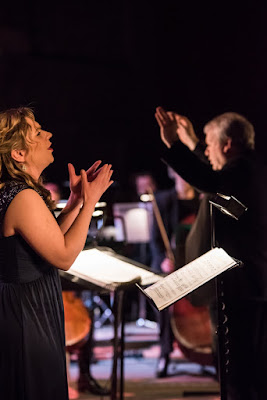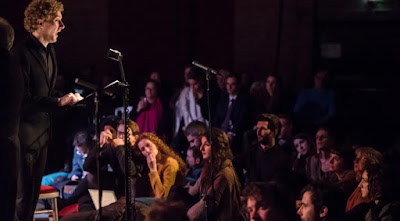 |
| CLoSer at the Village Underground photo James Berry |
Bach Toccata and Fugue in D minor BWV 565,
Mahler Das Lied von der Erde;
Gwilym Bowen, Anna Huntley, Michael Collins,
City of London Sinfonia, Rachel Rose Reid;
CLoSer at the Village Underground
Reviewed by Ruth Hansford on Feb 17 2016
Star rating:
The City of London Sinfonia evoking the 1920's Vienna of Schoenberg in a Shoreditch club
The City of London Sinfonia (CLS) puts on concerts that 'promise to surprise us'. The first surprise was how easy it is to get lost in Shoreditch in the dark and the rain. Village Underground, as most people probably know, is a 'found space' around an abandoned railway viaduct; this contributed to the secret, club-like character of the event, with its bouncers and CCTV at the door and, once inside, cushions on the floor and bar drinks in huge plastic cups.
The main space is a T-shape, the band positioned with a flat brick wall behind and audience seats (and cushions) on three sides. We were invited to leave our phones on, take photos, tweet, wander around, drink, chat, but not clap between the Mahler songs. It felt like a late-night Prom (including the whooping from the audience) – a classical concert minus the printed programme. Michael Collins & members of the City of London Sinfonia were joined by tenor Gwilym Bowen, mezzo-soprano Anna Huntley and story-teller Rachel Rose Reid for chamber versions of Strauss's Rosen Aus Dem Süden, Bach's Toccata and Fugue in D minor BWV 565, and Mahler's Das Lied von der Erde.
The first and last pieces in the concert were arranged by Schoenberg for the Society for Private Musical Performances which, in post-First World War Austerity Vienna, brought salon-scale versions of larger works to an audience of enthusiasts, who were not allowed to clap (or whoop, presumably), or boo, and the press were banned. Art for art's sake. Something we forget to enjoy these days?
Johann Strauss' (yes, Johann's) Rosen aus dem Süden was given the Schoenberg treatment for string quartet, piano and harmonium, and wonderfully kitsch it sounded too, with its dirty low rumble and its full stops so that anyone trying to waltz to it would be guaranteed to trip over. Matthew Swann had introduced it as 'the equivalent of Quentin Tarantino sitting down with a tub of popcorn and a box set of Sex and the City'.
 |
| Anna Huntley, Michael Collins & City of London Sinfonia - photo James Berry |
Storyteller Rachel Rose Reid vividly set the scene for the performance of Das Lied von der Erde with her description of the tumult in Mahler's mind at the time he was composing the piece. Forced out of anti-semitic Vienna, diagnosed with the heart condition that was to kill him, and having lost his daughter, he tried to find solace in the countryside at Maiernigg. Nature and solitude did not isolate him from fears of failure and death, rather spurred his creativity. Reid's story quoted Hebrew prayer and the Lutheran bible ('For all flesh is as grass') as well as Mahler's own words and themes from Des Knaben Wunderhorn, taking us on a circular journey to the Austrian Tirol and back to Shoreditch. A powerful reminder of the way art reinvents itself was the image of the musician who discovers the corpse of a man in the forest and makes a flute from his bones.
Das Lied von der Erde is really Mahler's Ninth, disguised to cheat the death sentence pre-ordained for anyone who wrote nine symphonies. Scored for huge forces and notoriously hard on the tenor (any tenor), this chamber version might be expected to be a little more forgiving. But with only a string quintet to provide the fat, low frequencies, and the expanse of brick wall for the high frequencies of the wind quintet (especially the klezmer sounds of the E flat clarinet) to bounce off, it made the complex text impossible to follow. In spite of Reid's introduction, we did feel a little deprived of the poetry.
Mahler used as his source poems from Hans Bethge's 1908 collection 'Die chinesische Flöte' (The Chinese Flute). Based on T'ang dynasty poetry and re-written in places by Mahler, the cycle is a symphony in all but name, with a huge emotional and dynamic range and exploiting the full range of colours a symphony orchestra can offer. Schoenberg's re-working offered that with much smaller forces. Tenor Gwilym Bowen entered into the spirit of 'Das Trinklied vom Jammer der Erde' (Drinking song of the earth's sorrow) gamely shouting rather than drinking his way to oblivion among the massive sound of the lower strings, horn and percussion. The third song 'Von der Jugend' (Youth) is more naïve and compact but the fifth is back to the heroics of the first 'Der Trunkene im Frühling' (The drunkard in spring), albeit with more light and shade. The orchestra could not help but let rip. I do hope after this Bowen can go back to singing the Evangelist.
 |
| Gwilym Bowen - photo James Berry |
Reviewed by Ruth Hansford
J. Strauss arr. Schoenberg Rosen Aus Dem Süden
by arrangement with Universal Edition A.G. Wien
Bach arr. Luke Styles Toccata and Fugue in D minor BWV 565
Mahler arr. Schoenberg/Rainer Das Lied Von der Erde
by arrangement with Universal Edition A.G. Wien with storytelling introduction by Rachel Rose Reid
Michael Collins conductor
Anna Huntley mezzo soprano
Gwilym Bowen tenor
Rachel Rose Reid storyteller
City of London Sinfonia:
Violin 1: Alexandra Wood. Violin 2: Jane Carwardine, Viola: Fiona Bonds, Cello: Sue Dorey, Bass: Lynda Houghton, Flute & piccolo: Karen Jones, Oboe: Dan Bates, Clarinet: Katherine Spencer, Bassoon: Ursula Leveaux, Bass & Eb clarinets: Hannah Morgan, Horn: Stephen Stirling, Percussion: Geoff Boynton, Tim Gunnell, Piano: John Alley, Harmonium & celeste: Iain Farrington
Elsewhere on this blog:
- The symphonic organ: Tim Byram-Wigfield at Rochdale Town Hall - CD review
- Beyond Mozart: The second part of my encounter with Ian Page of Classical Opera - interview
- Classical to neo-classical: Mahan Esfahani & Avi Avital - concert review
- Strapless: New Christopher Wheeldon ballet with Mark-Anthony Turnage score - ballet review
- Notable first: ENO first Norma - opera review
- Pinks and Blues: Debut disc from pianist Christina McMaster - CD review
- Eclectic cross-arts: Bastard Assignments in Brixton - concert review
- Music and poetry: Rosa Feola & Iain Burnside in Respighi, Martucci, Ponchielli, Liszt - CD review
- Eclectic mix: Andrew Keeping's Classic guitar - CD review
- Visceral & involving: Bach's St. John Passion - concert review
- Telling a story through programming: My encounter with Ian Page of Classical Opera - interview
- Home









%20as%20Leporello%20and%20Erik%20Tofte%20(back%20to%20camera%20in%20garnet%20shirt)%20as%20Giovanni%20-%20Don%20Giovanni.jpg)

Very nice website and articles. I will be realy very pleased to visit your website. Now I am found that we actually want. I check your website everyday and attempt to learn something from a blog. Thank you and looking forward to your new submit.
ReplyDeleteZayn - Pillowtalk Nightcore
Flo Rida - My House Nightcore
Adele - Hello Nightcore
Justin Bieber - Love Yourself Nightcore